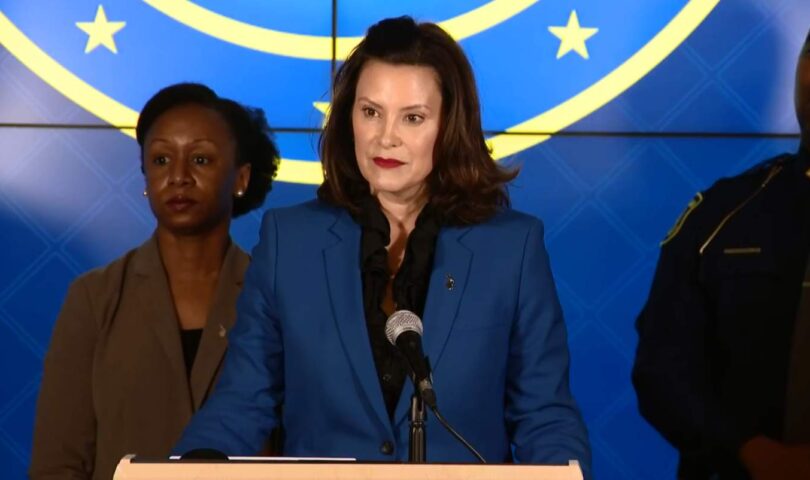Lansing — The Michigan Supreme Court ruled on Friday that Gov. Gretchen Whitmer did not have authority after April 30 to issue or renew any executive orders related to the COVID-19 pandemic under the 1976 Emergency Management Act.
The court, in its 71-page ruling, also found Whitmer did not possess the authority to exercise emergency powers under the 1945 Emergency Powers of the Governor Act because the act violates the Michigan Constitution.
Whitmer said Friday she “vehemently” disagreed with the court’s ruling, which she said made Michigan an “outlier” among the vast majority of states that have emergency orders still in place.
The governor said the order doesn’t take effect for 21 days and, even after that, her orders will remain in place through “alternative sources of authority.”
The ruling appears to leave intact orders issued by the Department of Health and Human Services, which have addressed some of the same subject matter contained in Whitmer’s executive orders.
“I want the people of Michigan to know that no matter what happens, I will never stop fighting to keep you and your families safe from this deadly virus,” she said.
Republican House Speaker Lee Chatfield said Friday that the Legislature stands ready to deliberate in a bipartisan way on pandemic response.
Early on in the pandemic, the GOP-led Legislature submitted some suggestions to Whitmer that were eventually adopted within the executive orders and, since then, lawmakers have passed some laws that supported her executive orders, such as those pertaining to school reopening protocol.
Other bills the Legislature has approved regarding COVID-19, such as liability assurances for medical providers, have been vetoed by Whitmer.
Friday’s ruling concluded the EPGA violated the Michigan Constitution because it delegated to the executive branch the legislative powers of state government and allowed the executive branch to exercise those powers indefinitely.
“Under the EMA, the Governor only possessed the authority or obligation to declare a state of emergency or state of disaster once and then had to terminate that declaration when the Legislature did not authorize an extension; the Governor possessed no authority to redeclare the same state of emergency or state of disaster and thereby avoid the Legislature’s limitation on her authority,” the ruling said.
The ruling said while the EPGA only allows the governor to declare a state of emergency when public safety is imperiled, “public-health emergencies such as the COVID-19 pandemic can be said to imperil public safety.”
The Supreme Court’s ruling on the question of the 1976 Emergency Management Act was unanimous. But the ruling on the 1945 Emergency Powers of the Governor Act saw a 4-3 split with Republican-nominated justices ruling the act unlawfully delegated legislative power to the governor.
Those ruling against the act were Justices Stephen Markman, Brian Zahra, Beth Clement and David Viviano.
Viviano noted the orders issued by the Department of Health and Human Services in support of Whitmer’s executive orders, appearing to leave the agency’s authority in place.
“In other words, nearly everything the governor has done under the EPGA, she has also purported to do, via the DHHS Director,” he wrote.
Chief Justice Bridget McCormack wrote the dissent joined by Justices Richard Bernstein and Megan Cavanagh.
McCormack argued the federal and state supreme courts could only strike down a law as an unconstitutional delegation of power if there were no standards contained in the law to guide the decision-maker. The EPGA, McCormack said, contained the standards that the governor’s orders must be “reasonable” and “necessary” and issued in an attempt to protect life, property and bring an emergency under control.
McCormack said the high court was “needlessly” injecting itself into a “emotionally charged political dispute.”
Three medical centers filed suit against Whitmer in federal court earlier this year in a challenge to her executive order that prohibited non-essential procedures at the height of the pandemic.
The suit argued the 1945 Emergency Powers of Governor Act lacked reference to epidemics or public health and that the act’s use of the word “emergency” implied a specific time limit.
House Speaker Lee Chatfield, R-Levering, said on Twitter that the court ruled in agreement with the Legislature that the 1945 law is unconstitutional.
“The governor had no right to extend the state of emergency over the Legislature’s objection. Our Constitution matters, and this was a big win for our democratic process,” Chatfield said.
Michigan Republican Party Chairwoman Laura Cox added the ruling marked “a great day for the people of Michigan.”
“Gov. Whitmer overexerted her powers,” Cox said. “The Legislature wants to be a willing partner in dealing with COVID-19, and Governor Whitmer should recognize their duly delegated role.”
Lower courts have previously interpreted the 1945 law as giving the governor the ability to declare an emergency and then determine when the emergency is over.
It’s one of two laws that allow a Michigan governor to declare an emergency. The 1976 Emergency Management Act includes a time limit that requires the legislative approval to extend an emergency past 28 days.
The suit from the medical centers closely aligned with litigation filed by the GOP-led Michigan Legislature, which has argued Whitmer’s unilateral powers violate the separation of powers in government.
The governor’s emergency powers should last only as long as it takes for the Legislature to assemble itself to address the emergency, argued lawyers for the GOP Legislature and the Mackinac Center for Public Policy, the group representing the medical centers.
Deputy Solicitor General Eric Restuccia, who represented the governor in the case, countered that Whitmer’s unilateral authority is necessary to ensure the governor can continue to act in the event that an emergency prevents the Legislature from holding session or makes it impractical to wait for lawmakers to go through the lawmaking process.
Whitmer has issued more than 180 executive orders since the start of the pandemic under the 1945 Emergency Powers of the Governor Act and the 1976 Emergency Management Act, the latter of which has a 28-day time limit unless extended by the Legislature.
The state high court only considered the arguments of the medical centers after federal district Judge Paul Maloney requested they rule on the question of Whitmer’s emergency powers before he decided on the merits of their case.
Separately, a petition initiative drive led by the Unlock Michigan committee has collected more than 400,000 signatures to repeal the 1945 law at issue in the case.
Whitmer first declared a state of emergency because of COVID-19 on March 10. Since then, Michigan has confirmed more than 121,000 cases of the virus and 6,700 deaths linked to it.
- MYWAY Sault Bridge Brawl & NEMWA Regional Results - February 22, 2024
- Crawford County Prosecutor clears State Trooper in the fatal shooting of man earlier this month - February 23, 2023
- Court: Sault PD can’t conceal police force policy - February 23, 2023




